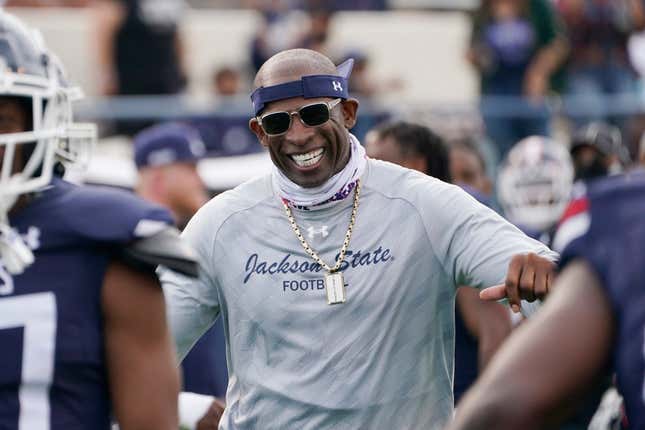
Coach Prime ain’t having it.
The NFL Hall of Famer and Jackson State University head football coach, nee Deion Sanders, is not happy about Alabama coach Nick Saban’s take on how Jackson State is recruiting players. Saban apparently got a bug in his drawls on Wednesday, ranting at an event about how so-called name, image and likeness, or NIL, deals have changed the college sports recruiting game.
Nevermind that like every Power 5 program, Alabama, one of the richest and most successful college football programs in history, has always had boosters willing to shell out a few dollars to show love to prospective players. Saban insisted that his Crimson Tide has never “bought” players–a helluva word choice considering the mostly Black players laboring at predominantly white institutions for no compensation–but said NIL deals are essentially allowing other programs to do so. One of his examples? Sanders’ Jackson State team.
“Jackson State paid a guy $1 million last year who was a really good Division I player to come to their school,” said Saban. “It was in the paper, and they bragged about it. No one did anything about it.”
Saban was likely referring to former Florida State commit Travis Hunter Jr. The No. 1 prospect in the 2022 recruiting class stunned the sport in December’s Early Signing Period when he spurned the Seminoles and signed with Jackson State. The dollar amount would appear to stem from reports — which have been refuted — that Hunter earned $1 million through an NIL deal with Barstool Sports.
Coach Prime wasn’t in the mood for catching strays and went to social media to address the call out.
So far, though, there’s been no further response from Sanders of Jackson State.
Saban may be frustrated over other colleges’ newfound ability to compete for players that programs like his once upon a time would have had to themselves. Even assuming Alabama has always played by the NCAA’s onerous rules banning the school and its boosters–wealthy donors willing to color outside the lines a bit–from compensating players, there’s absolutely no doubt that his program has always enjoyed an advantage based strictly on resources.
Saban himself makes a reported $9.5 million under the same system that disallows schools to directly compensate athletes beyond the value of their scholarships, room and board and small per diems for food when traveling. Though it doesn’t break out the numbers by sport, the school’s athletic operating revenue was $179.8 million in fiscal year 2021.
By comparison, Jackson State posted operating revenue of $104 million for the entire university in its 2018 fiscal year, the most recent year that data was posted to the school’s web site. The school operated at an $82.1 million operating loss that year.
The NCAA approved NIL deals, in which student athletes can be compensated by sponsors for the use of the name, image or likeness, in 2021. That was mostly an acknowledgement that several state legislatures were already poised to pass laws guaranteeing the athletes that right, in addition to codifying a way around the NCAA or schools themselves from paying athletes out of their pockets.

